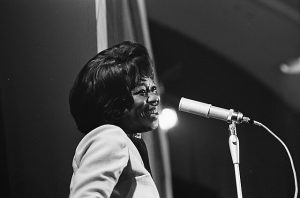Lennie Tristano Day
March 19, 1919 – November 18, 1978
A tribute to the influential pianist and teacher
Click here if you have a memory of this artist that you’d like to share
–
Click here to Support Jazz on the Tube
Pianist and educator Leonard “Lennie” Tristano was born on March 19, 1919 in Chicago, Illinois.
Born with weak eyesight that was completely gone by the time he was nine, he had classical piano lessons starting when he was eight and played several instruments in his early days including clarinet, saxophones, trumpet, guitar and drums.
Tristano, who played some jobs in the early 1940s on tenor before deciding to exclusively concentrate on piano, worked as a teacher and began getting attention as a pianist with his own fresh conception during 1944-45 when he performed regularly in Chicago.
He moved to New York in 1946, worked with a trio that usually included guitarist Billy Bauer and a bassist, and developed a harmonically advanced style influenced by bop but emphasizing endless melodic lines and unusual accents on familiar chord changes over a quiet metronomic rhythm section.
Tristano started utilizing altoist Lee Konitz in his group (along with a drummer) by 1948 and, later that year, tenor-saxophonist Warne Marsh made the group a sextet.
Tristano, who appeared on the radio on a couple of broadcasts in 1947 that included Charlie Parker and Dizzy Gillespie, and was on the 1949 Metronome All Star session, made his most important recordings in 1949.
Konitz, Marsh and Bauer were in the sextet for such remarkable numbers as “Wow,” “Crosscurrent,” “Sax Of A Kind,” “Intuition” and “Digression”; the latter two were the first ever recorded free improvisations in jazz.
Lennie Tristano continued playing his unique music in the 1950s and ‘60s in addition to teaching his concepts to a wide variety of musicians (from Connie Crothers to Bud Freeman) although he recorded fairly little after the mid-1950s and nothing (other than accompanying singer Betty Scott) after 1966.
The pianist is featured on a solo version of “You Don’t Know What Love Is” from 1965.
-Scott Yanow
Click here if you have a memory of this artist that you’d like to share
–


